FRANCE SINCE WATERLOO.
France since Waterloo. By W. Grinton Berry, M.A. (Methuen and Co. 6s.)—Mr. Berry has evidently studied his subject with much care; he writes with great vivacity, and sets off his matter with an attractive style. And he has in no small measure the gift of historical insight. His appreciation of the good qualities of Louis XVIII., who showed that for once, at least, a Bourbon could learn and forget, is an instance which might be matched again and again. The estimate of Napoleon III. is particularly good. For all his follies and misdoing's, he had something of the wise ruler about him. And for what was bad in the system of the Second Empire "France," as Mr. Berry puts it," cannot evade her responsibility." She cannot undo the fact that she put this man in power by a vote that was as ranch like unanimity as can be expected in the region of politics. The five million and a half votes which set him above Cavaignac in 1848—Cavaignac polled about four millions lees—grew to seven millions and a half (against six hundred and forty thousand) in 1852. If we make any count of mandates, what could be plainer than this ? For the most part we find ourselves in accord with Mr. Berry's judgments on persons and events. But there are occasions when we are inclined to protest. " Patriotic " is not the epithet which we should have chosen in characterising the mob that massacred the Swiss Guard on August 10th, 1792. Sometimes we might fancy that we were reading a controversial pamphlet, not a history. We have heard it said before that the officers of our Army are "mainly drawn from an exclusive aristocratic caste," but not in a work of such gravity. Surely such a statement is hardly in accord with our competitive system and with the arrangements of the educational ladder. So far as it is true at all, the cause is to be found in the insufficient pay. If a "living wage" were given to the officer, what exclusiveness there is would soon disappear.






































































 Previous page
Previous page